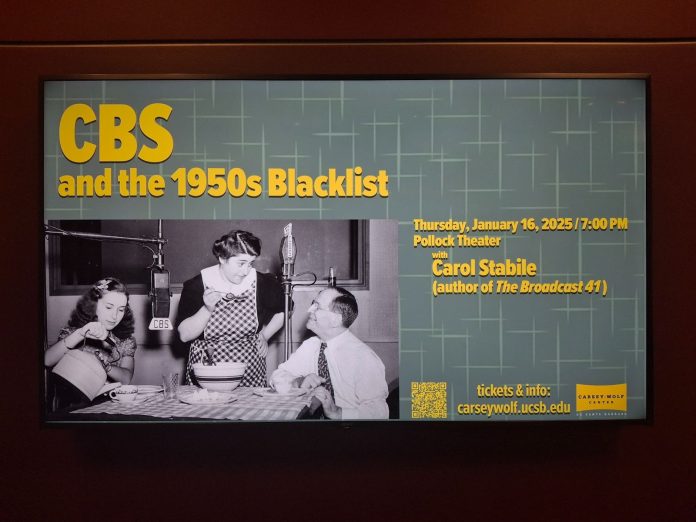Cameron Karimi-Zand
Contributing Writer
On Thursday night, Jan. 16, UC Santa Barbara (UCSB) students and community members had the opportunity to attend the “CBS and the 1950s Blacklist” event hosted by the Carsey-Wolf Center (CWC). This was 2025’s first installment of the CWC’s “Panic!” series, which displays examples of media that has been influenced by social panic for examination. Attendees were first presented with two pieces of media from the American anti-communist era that had a strong influence in Hollywood spaces. Afterwards, there was a live discussion between CWC director Patrice Petro, who moderated, and professor Carol Stabile of the University of Oregon, whose book, “The Broadcast 41,” not only explored the subject of the night’s event in particular, but also inspired the “Panic!” series as a whole.
The first piece of media the audience observed was a radio broadcast, CBS’s “Open Letter on Race Hatred.” Although many of those present were “not used to just listening to things,” as Petro pointed out in her introduction, the CWC’s use of a form of media that was popular in the mid-20th-century appropriately set the tone for an analysis of period-specific events. The 1943 broadcast talked about contemporary race riots, pointing out how the lack of racial harmony makes the U.S. look bad on the international stage.
After the broadcast, those in attendance were shown an episode of the sitcom “The Goldbergs” from 1957. The episode, titled “Mother-in-Law,” involves the Jewish-American titular family addressing the social etiquette of how one should properly address their mother-in-law. Despite the age of the show, the humorous moments of faux-pas and the wacky family dynamics still held up with a modern audience, with plenty of laughs coming from the crowd that seemed to appreciate a break from the serious tone of the radio broadcast.
Following the two media artifacts, Stabile joined Petro on stage to discuss the pieces of media as well as the socio-political contexts in which they were made. They first discussed Stabile’s “The Broadcast 41,” which details the stories of forty-one women in media who were blacklisted by anti-communist forces during the mid-20th-century. The discussion then led to an explanation of how the media which was selected for the event related to Stabile’s book. Starting with the CBS radio broadcast, Stabile explains that in her research — which involved filing multiple Freedom of Information Act requests — she found that the radio broadcast had appeared “again and again in the FBI files.” It turns out that this Peabody-winning broadcast had caught the attention of the FBI because of its sympathetic attitude toward racial minorities at the time. The FBI believed that racial minority movements were the result of communists trying to stir trouble in the U.S., leading them to see the broadcast as a threat. Despite the initial success of the broadcast, the man behind it — William Robson — was fired from his position only a few years later.
The topic then turned to “The Goldbergs” and why it was selected for the event. While the show appeared very apolitical on the surface, there were two aspects of it that made it a target for the FBI. Firstly, it was attacked because it showcased an “ethnic family” that strayed from the norms because they lived in a “multigenerational household,” Stabile explained. In addition to this, the actor who played the husband, Philip Loeb, had liberal political affiliations. Despite the fact that the FBI didn’t even suspect that he was a Communist Party member, they still pressured the show’s star and creator, Gertrude Berg, to fire him.
After discussing other instances of blacklisting in Hollywood, the panel started to take questions from the audience. One audience member added to the conversation by recounting his experiences working at CBS for over 40 years, noting that it has taken a generation to recover from the effects of blacklisting. This comment tied into the event’s critical point: what happened over 60 years ago isn’t fully disconnected from our present day reality. While these pieces of media were created to present particular messages at the time of their inception, today they carry a new message — a warning of what can happen when political polarization is taken to extremes.
In response to the notion that the U.S. has never been more polarized than today, Stabile clarified that the U.S. “was a deeply polarized nation” during the blacklisting period. As such, series like “Panic!” might be especially important to take note of during this day and age.
The next installment of “Panic!” series — “The Sound of Fury” — will be held on Tuesday, Jan. 28, from 7-9:30 p.m. The event will show a film that explores the themes surrounding mob justice, followed by a discussion between author Rebecca Prime and UCSB film and media studies professor Ross Melnick.











